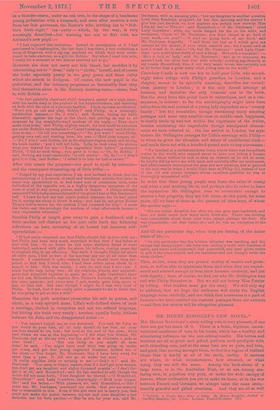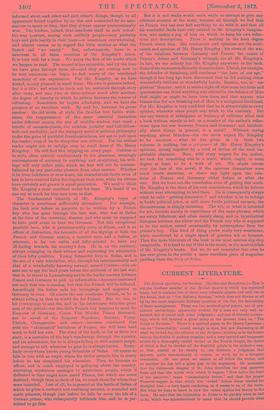MR. HENRY KINGSLEY'S NEW NOVEL*
MR. HENRY KINGSLEY'S story-telling vein is very pleasant, if one does not get too much of it. There is a fresh, vigorous, uncon- ventional manliness of tone in his books, which has a healthy and stimulating influence on the non-critical reader. His heroes and heroines are all so great and gifted, perform such prodigies with such exceeding ease, and at the same time are so pure, and true, and good, that moving amongst them, we feel in a region of realised ideals that is hardly at all of the earth, earthy. It matters not where, in what circumstances, how situated, or what doing, they are still the same. Among the back-slums of a large town, or in the Australian Bush, or at sea among sea- faring men, in populous city pent, or under the wide canopy of heaven, where civilisation has yet to make its home, or in the war between French and Germans, we always meet the same excep- tionally graceful and gifted creatures. And they are all so well * Valentin: a French Boy's Story of Sedan. By Henry Kingsley, Author of "Geoffrey Hamlyn," &a. 2 vols. London: Tinsley Brothers. 1872. informed about each other and each other's doings, though to all appearance bound together by no ties and connected by no asso- ciations in space or time, that they always appear preternaturally wise. The wisdom, indeed, that manifests itself in such out-of- the-way quarters, among such unlikely people—very probably boys and girls hardly in their teens—is sometimes overwhelming, and almost causes no to regard the little urchins as what the
Scotch call "no canny." But, unfortunately, there is a sameness in all these creations of Mr. Kingsley's fancy. It is very well for a time. We enjoy the first of his works which we happen to read. The second is less enjoyable, and by the time we have gone through them all—and they are coming now to be very numerous—we begin to feel weary of the unrelieved monotony of our experiences. For Mr. Kingsley, as we have hinted, is only pleasant in small doses. His vein is genuine indeed, but it is thin ; and when he beats out his materials through story after story, and one, two, or three-volume novel after another, the degree of tenuity at which he arrives becomes the reverse of refreshing. Sometimes he begins admirably, and we have the prospect of an excellent work. By and by, however, he grows careless ; the old tricks of style, the familiar but feeble witti- cisms, the reappearance of the same essential characters under different names, the airs of worldly-wisdom that mask a bundle of common-places, the reckless joviality and hail-fellow- well-met cordiality, and the trumpery moral or political philosophy under the guise of youthful frankheartedness, are apt to pall upon the reader, even if he be altogether non-critical. For the critical reader ought not to indulge even in small doses of Mr. Henry Kingsley. He will find him tripping on every page. Careless as to style, often entirely revolutionary in his grammar, seemingly contemptuous of accuracy in anything and everything, his writ- ings will only inflict pain, which we fear will not be counter- balanced by any particular pleasure from other sources. Whether it be from indolence or over-haste, his characteristic faults seem of late to have received fuller development than ever, while his virtues have certainly not grown in equal proportion. We used to think Mr. Kingsley a most excellent writer for boys. We doubt if we can say as much for him now even as that.
The fundamental identity of Mr. Kingsley's types of
character is sometimes sufficiently anomalous. For example, the book now before us purports to be written by a French boy who has gone through the late war, who was at Sedan at the time of the crowning disaster, and who must be supposed to have good cause to hate the Germans. But this exceptional youthful hero, who is preternaturally acute at fifteen, and is an officer of distinction, the favourite of all the bigwigs of both the French and German armies, a married man and a father, at nineteen, is far too noble and lofty-minded to have any ill-feeling towards his country's foes. He is, on the contrary, always enlarging on their virtues and expressing his admiration of their lofty qualities. Young Schneider lives in Sedan, and is the son of a very wise father, who, through his instrumentality and that of a wonderfully knowing servant, named Cartier—who are sent out to spy the land years before the outbreak of the last war, that is, to travel in Luxembourg and in the border country between France and Germany to pick up information—becomes convinced not only that war is coining, but that the French will be defeated. Accordingly the father sells his belongings and migrates to Germany in time. Of coarse the son continues French, as he is always telling us that he would die for France. But he, too, in his journeyings to and fro, and in his intercourse with the great men of the period—for this little French boy happens to meet the Emperor of Germany, Count Von Moltke, Prince Bismarck, not to speak of the Emperor Napoleon, Bazaine, Viuoy, Uhrich, Changarnier, and others—becomes convinced that with the "attenuated" battalions of France, she will have hard work to bold her own. The story of the book, so far as there is a story, is a narrative of the boy's wanderings through the country, and his adventures, for he is always falling in with notable people, and strange to tell, wherever he goes he is always known. Every- body everywhere knows young Schneider of Sedan. Of course he falls in love with an angel, whom his father permits him to marry before he has completed his education. Then he becomes an officer, and is much employed in galloping about the country, conveying mysterious messages to mysterious people, which if delivered in time might have saved France, but which are never destined, though from no fault of his, to reach those for whom they were intended. Last of all, he is present at the battle of Sedan, of which he gives a confused and confusing account, is wounded and made prisoner, though just before he falls he saves the life of a German prince, who subsequently befriends him, and he is per- mitted to go free. But it is not really worth one's while to attempt to give any coherent account of the story, because all through we feel that no French boy has ever had anything to do with it, and that all his wonderful deeds have only existed in Mr. Kingsley's imagina- tion, who makes a peg of him on which to hang his own reflec- tions and descriptions. There is nothing in the least degree French about him. His sentiments and opinions are the senti- ments and opinions of Mr. Henry Kingsley ; his views of the war, of the relations between Germany and France, the causes of France's defeat and Germany's triumph, are all Mr. Kingsley's. In fact, we see nobody but Mr. Kingsley anywhere in the book. Some of the views are sufficiently characteristic. Uhrich, for example, the defender of Strasburg, still continues "the hero of our age," though it has long ago been discovered that he did nothing either wonderfully brilliant or wonderfully heroic. Bazaine, too, is "our glorious" Bazaine ; and it is settled right off that none but fools and ignoramuses can think anything was omitted in the defence of Metz that might or ought to have been done, and that anyone who blames him for not breaking out of Metz is a malignant blockhead. For Mr. Kingsley is very confident that he is always right in every opinion, whatever other people may think to the contrary. But can any stretch of indulgence or leniency of criticism allow that a book written merely to tell us a number of the author's reflec- tions upon the war between France and Germany, and incident- ally about things in general, is a novel? Without saying anything about blunders—for we never expect Mr. Kingsley to be accurate — what he has given us in these two volumes is nothing but a pot-pourri of Mr. Henry Kingsley's opinions, strung together by a cord of fiction of the most hot- probable character. Now, with every respect for the author, we look for something else in a novel, which ought, in some degree at least, to be a work of art. We might excuse even the loss of the novel, if the opinions themselves were much worth attention, or threw any light upon the rela- tions of France and Germany either before or after the war. But we have not the consolation even of getting this much. Mr. Kingsley is the slave of his own associations, which he follows without ever attempting to lead them. He is consequently always what he calls "getting discursive ;" and whether it be to indulge in feeble political jokes, or still more feeble political sarcasm, the discursiveness is simply irritating. The wit, or what is intended for wit, consists mainly in repetitions of the same phrases, which are rarely felicitous, and often merely slang, and in hypothetical dialogues between the editor and the French boy who is supposed to be the author, varied occasionally by interruptions from the printer's boy. This kind of thing grows really very wearisome, when unrelieved by a single spark of genuine wit or humour. Then the mere literature of the book is the most careless slip-slop imaginable. It is hard to say if this is the worst, or the most childish of Mr. Kingsley's books. But we do not remember that even he has ever given to the public a more worthless piece of magazine- padding than the Story of Sedan.



































 Previous page
Previous page